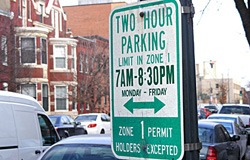Earlier this year, State Senator Daniel Squadron and Assemblymember Joan Millman proposed legislation that would allow New York City to develop and institute a plan for residential permit parking. Such an RPP program could help ease concerns over parking in neighborhoods where that commodity is scarce, designating street parking spaces specifically for local residents.

The City Council’s Committee on State and Federal Legislation, chaired by Councilmember Helen Foster, held a meeting on the state legislators’ proposal on Nov. 2. Park Slope Civic Council President Michael Cairl presented testimony at the hearing. With the opening next year of Barclays Center at Atlantic Yards, “we will see people who choose to drive to the arena scouting the neighborhood for on-street parking,” Cairl said, “imposing an unfair burden on a community that even today is dealing with increased congestion. …
“The Park Slope Civic Council urges the Legislature to pass the enabling home-rule legislation for RPP and the City to embark on a pilot RPP program,” he concluded.
The full City Council passed a home-rule message that supported the state proposal by a vote of 40-8 the next day. The Assembly and State Senate must still pass the bills before any action can take place.
The Civic Council’s full testimony to the committee on the legislation follows.
TESTIMONY BY THE PARK SLOPE CIVIC COUNCIL TO
THE COUNCIL OF THE CITY OF NEW YORK
COMMITTEE ON STATE AND FEDERAL LEGISLATION
NOVEMBER 2, 2011
Thank you, Chairperson Foster and members of the Committee on State and Federal Legislation. My name is Michael Cairl, I am the President of the Park Slope Civic Council, and I appreciate the opportunity to address this Committee on this matter of vital importance to the future of New York City.
The Park Slope Civic Council was founded in 1896 as the South Brooklyn Board of Trade, and it is one of the oldest civic associations in Brooklyn. The Civic Council is proud to have worked for several years with civic organizations in neighboring communities and with our elected officials to advocate Residential Permit Parking, or RPP, in selected locations in the City.
Chairperson Foster, directly to the west and south of your district one sees the poster child for RPP, Yankee Stadium. It is well documented that the parking garages that the New York Yankees insisted be built in Macombs Dam Park and elsewhere are seriously underutilized, partly because of the success of Metro-North service to the Stadium and in large part because of the high cost of parking. It is also well documented that while some people who choose to drive to events at the Stadium are utilizing private parking facilities, many others are parking on the street. Local residents, who already have suffered the indignity of losing a community park in favor of a mostly empty parking garage, suffer again for being unable to park close to where they live.
Another poster child for RPP is emerging right on our doorstep in Brooklyn: the Barclays Center arena, the first element of the redevelopment of Atlantic Yards. Because of a grossly protracted, 25-year schedule for completing the redevelopment, a large part of the Atlantic Yards site is intended to be a parking lot. If the experience at Yankee Stadium is any guide — and there should be no reason to believe that it is not — we will see people who choose to drive to the arena scouting the neighborhood for on-street parking, imposing an unfair burden on a community that even today is dealing with increased congestion. While the arena is at one of the major transit hubs in the City — four bus routes, nine subway lines, and the Long Island Rail Road — we do not doubt that many current Nets fans and other users of the arena will drive there, circling around the community until they park their vehicle and creating congestion, air quality and safety problems in the process. The emerging transportation plan for Atlantic Yards simply does not address congestion realistically or provide enough of an incentive for people to travel there by mass transit.
RPP in the areas surrounding Yankee Stadium and Atlantic Yards would provide exactly the right incentive to travel there by transit, limiting access by nonresidents to on-street parking. Many cities that have adopted RPP, from Hoboken to Washington to Seattle and others, have innovative mechanisms in place to accommodate businesses and visitors while giving parking priority to residents. This rich variety of RPP mechanisms is available to New York City to study for an RPP plan of our own.
In 2007 the Park Slope Civic Council went on record supporting RPP. We applaud the fact that Senator Daniel Squadron and Assemblywoman Joan Millman have stepped forward with home-rule legislation that would allow the City to implement RPP. The logical next step would be a pilot RPP program for the Yankee Stadium and Atlantic Yards communities to address an immediate need and give the City the opportunity to evaluate and modify RPP. Based on the results of a pilot program, both RPP and its enabling legislation might require fine-tuning.
Chairperson Foster and members of this Committee, the time to introduce RPP is now. We are sure that the benefits of reduced congestion and increased safety for all users of local streets will be immediate and substantial. In conclusion, the Park Slope Civic Council urges the Legislature to pass the enabling home-rule legislation for RPP and the City to embark on a pilot RPP program.
Thank you again for the opportunity to make this presentation.
from the November 2011 Civic News

